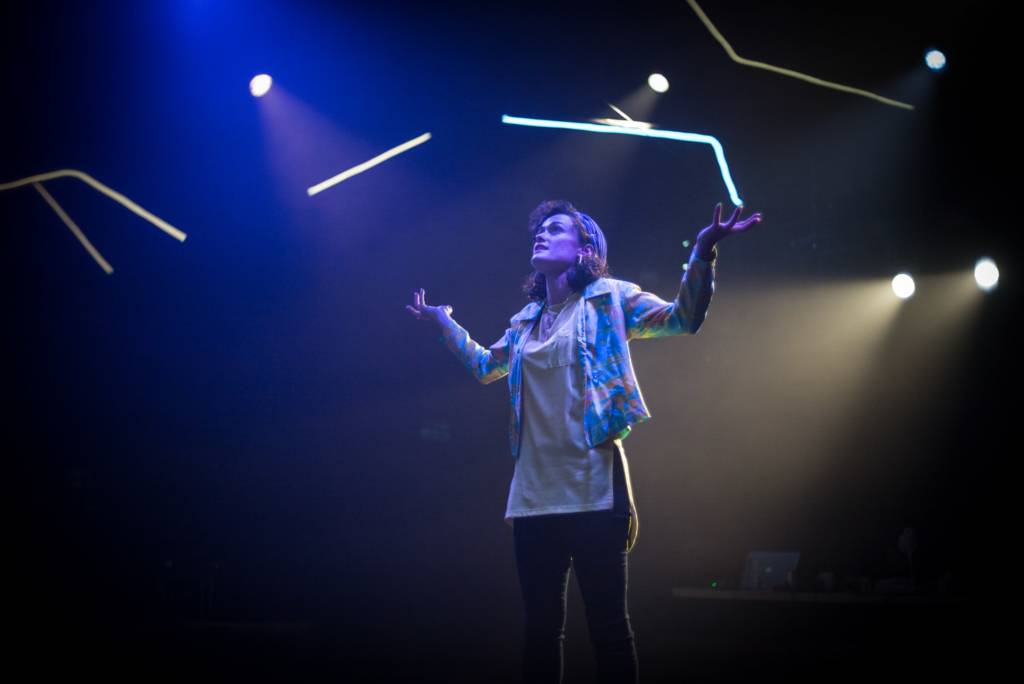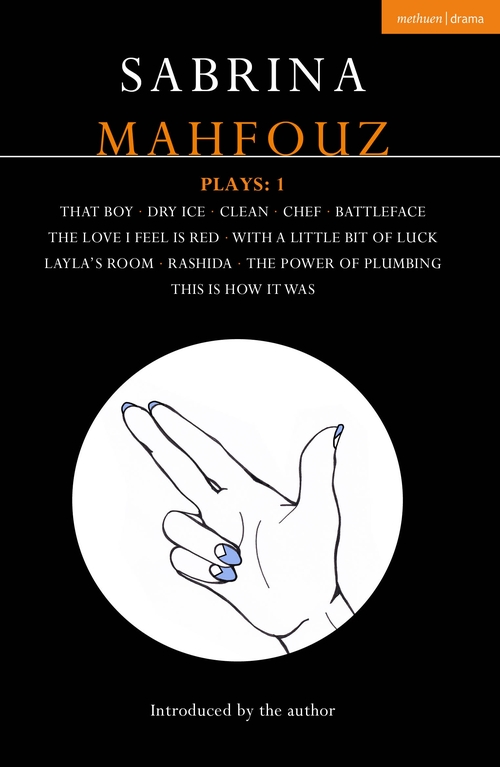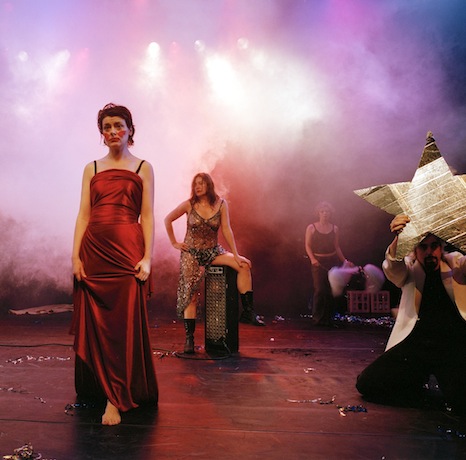Read full interview here.
Part 1: A Place to Think Communally
PC: What is theatre?
SG: The broadest definition of theatre, for me, is a place to think communally, where something live happens.
PC: What’s the role of the playwright in theatre?
SG: It’s been very changeable for me. I started out writing from a place of relative ignorance. I read a lot of plays but hadn’t seen a lot of theatre. There was a sort of dissonance between the work that I was writing and the work that was being programmed and commissioned. Then eventually, I wrote the most traditional play that I have ever written – Perve -and that was my first play. That was brilliant because it started my career, but it was also a weird process of having to undo something because that was all I was expected to write. So, I emerged as a certain kind of playwright and then I had to work out what kind of a playwright I wanted to be and how I wanted to work. I think that I’ve realised that I’m much more of a collaborative playwright now.
I actively try and write in a way that’s open – for better
or for worse. I’ll never retrospectively disallow certain interpretations or
versions of my work. That’s often built into the work: the stage directions are
sometimes suggestive rather than prescriptive. I write things like, “maybe
this happens.”
Also, the model of production is often quite fixed here: you
write a play, it gets given to a director, there’s a couple of weeks rehearsal
and then it’s on. That’s often not very fulfilling or satisfying or creative. Part
of resisting that is moving into creating work where I perform it. It’s about
being a bit bolder about ideas of control and authorship. It’s not something
that I’ll do exclusively, but it’s something that I’ve really enjoyed, and I’ve
benefited from as an artist.
PC: How have you felt bolder about ideas of control and authorship?
SG: It’s probably quite a subjective experience, but I felt subservient as a playwright at times. I started establishing myself as a writer and then started to perform, which is probably the wrong way around for most people. Then I started to direct my own work and then more recently co-directed Inside Bitch. It’s been quite a non-traditional, non-linear artistic pathway. That was, personally, about confidence as well and part of that is my personal journey to embracing queer in performance. Knowing who I am as an adult knowing what I’m doing, what I’m about, in general, as a human in the world has probably informed my confidence in terms of the work that I can make now or what I feel like I can share with an audience.
Also, I’m from a working-class background and even though I
went to Cambridge, in some ways, that knocked me into feeling that was a big
part of my identity in a way that it maybe hadn’t before. I’ve always been very
vocal, but I think in terms of a sense of entitlement I probably took a little
bit of a back seat for a while, also because I didn’t know how to enter the
profession. There was a lot of learning and now I’m at a different point in
that journey. Now the idea of creating solo work doesn’t scare me in a way that
it probably did once, or, I couldn’t even conceive of what it was – what is
live art? It’s been a really fun education.
PC: Has queerness, and the thinking around that, informed your journey towards the live art world?
SG: Massively, I think that there’s a great queerness that runs through the world of live art and contemporary performance more generally. We can see that in the mainstreamification or the appropriation of elements that have come from the queer scene and are now quite popular.
I’m from a very ‘non-arts’ background and I’ve often found
myself at a really tricky-place of how to make work that is conceptual and
intellectually challenging but also not alienating or inaccessible. I think it
can absolutely be done. Of course, we don’t all have a responsibility to do
that – I don’t mind going to see things that chew up my brain and aren’t
everyone’s cup of tea.
I’ve always felt like I come at things sideways. The fact that I come from Northern Ireland, which is itself a place of great duality, has always made me approach things sideways. Or being from a working-class background in an industry often with an absence of working-class voices. All that massively informs the way I make work and what I’m drawn to.
Stacey Gregg is from Belfast and is a writer, performer and director for stage and screen. Her plays include Josephine K and the Algorithms (Abbey Theatre, Dublin, 2018), Scorch (Outburst Queer Arts Festival, Belfast, 2015; Edinburgh Fringe, 2016); Shibboleth (Abbey Theatre, Dublin, 2015); Override ( Dublin Fringe 2017, Watford Palace Theatre, 2013); Lagan (Ovalhouse Theatre London, 2011); Perve (Abbey Theatre, Dublin, 2011; BBC Radio Drama Award 2012) and When Cows Go Boom (Abbey Theatre, Dublin 2008).
She co-directed Inside Bitch with Deborah Pearson as part of a collaboration between Clean Break and the Royal Court in 2019.
Her solo theatre piece, Choices, was part of B!RTH, a collection of international plays that question birth practice and the cultural pressures that surround it.
She co-created an interactive web installation for CRASSH
(Centre for Research in the Arts, Social Sciences and Humanities).
Television work includes The Letter for the King (Netflix), The Innocents (Netflix), Your Ma’s a Hard Brexit (The Guardian/ Headlong), Riviera (Archery Pictures / Sky), Spoof or Die (Channel Four) and The Frankenstein Chronicles (Rainmark).




